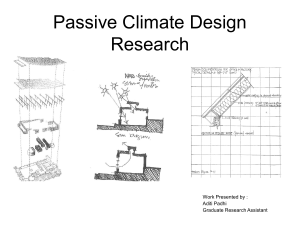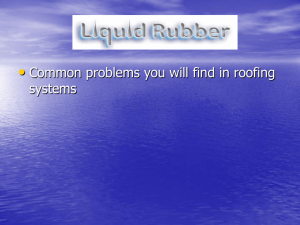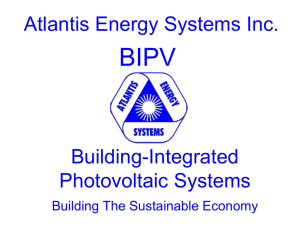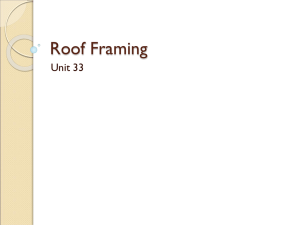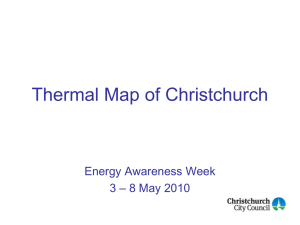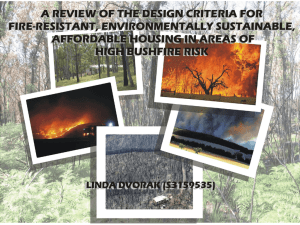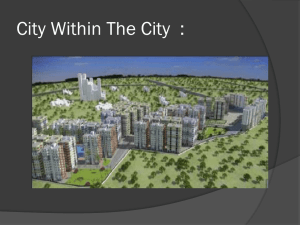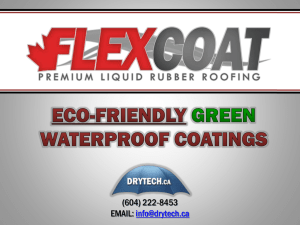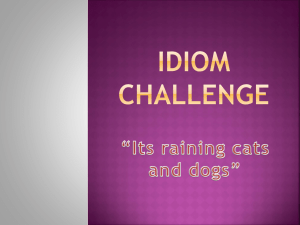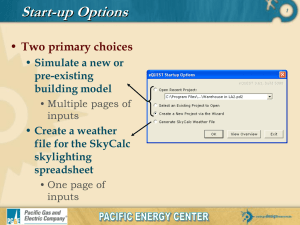File - Mechatronics 2k14
advertisement
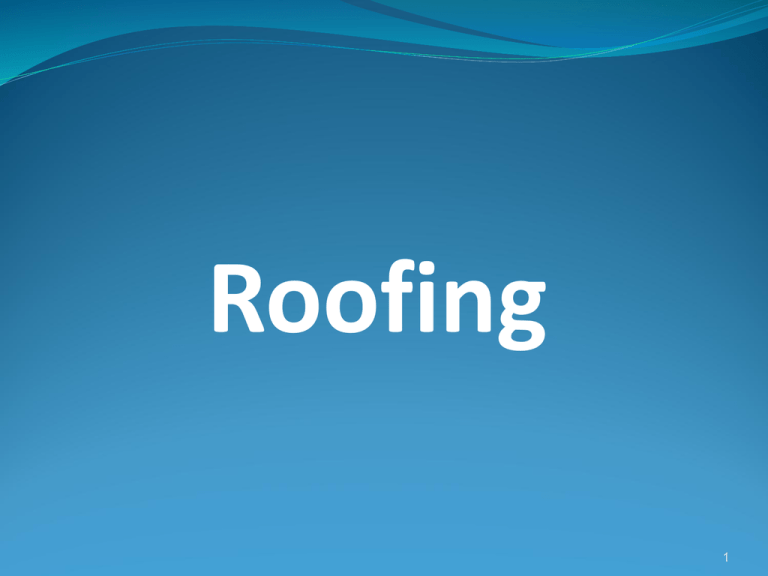
Roofing 1 ROOFS It is constructed to protect the building from weather (rain, wind, heat, snow, etc) Roof is the uppermost part of the building REQUIREMENTS OF A ROOF Durable against various natural agencies Adequate thermal insulation Water proof Fire resistant Sound insulation Good drainage arrangement CLASSIFICATION OF ROOFS 1. Pitched or sloping Single roof, 2. Double roof, 3. Trussed roof. 2. Flat or terraced 1. R.C.C roof, 2. Madras terrace roof. 3. Curved 1. Shell roof, 2. Dome roof. 1. PITCHED ROOFS These roofs have sloping top surface Suitable in those areas where rainfall/snowfall is very heavy Span: clear distance between the supports of beams, roofs or truss Rise: vertical distance between the top of the ridge and the wall plate Pitch: inclination of sides of a roof to the horizontal Ridge: an apex line of a sloping roof PITCHED ROOFS TERMS - ROOF Gable: triangular upper part of a wall formed at the end of a pitched roof Purlin: horizontal member placed over the principal rafters to support the roof membrane. TERMS - ROOF TYPES OF PITCHED ROOFS Single roofs Double or purlin roofs Trussed roof King post truss Queen post truss Mansard truss Bel fast truss Steel truss Composite truss SINGLE ROOF: 1.LEAN TO-ROOFS Rafters slope to one side only. Upper ends- rafters are fixed by nails to the wooden plates. Lower ends- rafters are notched & nailed to the wooden post plate. Battens are placed and fixed over rafters. Roof covering materials. Spans upto 2.5 m. 2.COUPLE ROOF Pair of rafters Slopes to both sides Upper ends- nailed to common ridge piece Lower ends- notched & nailed to wooden wall plates. Battens are fixed Roof covering materials Span upto 3.60 m. 3.COUPLE CLOSE ROOF Tie beam Prevent from spreading Spans upto 4.20 m. COLLAR BEAM ROOF Span increase or heavy load- leads to bend Prevent by raising the tie beam 1/3rd to ½ of the vertical ht. from wall plate to the ridge. Spans upto 5m DOUBLE OR PURLIN ROOFS Rafters- rest at the ends on wall Purlins- intermediate supports Spans upto 5.5 m. TRUSSED ROOF A number of straight members connected in the shape of triangle and forming a frame is known as truss. Truss are provided at regular interval of about 3m along the length. Used for the span more than 5m. KING-POST TRUSS King post- central post Struts- inclined members Principal rafterssupport the purlins Spans- 5 to 8 m. QUEEN-POST TRUSS 2 vertical posts Straining beam 2 struts Straining sill Spans- 8 to 12 m. MANSARD TRUSS Combination of king & queen post trusses. Upper portion- king post truss Lower portionqueen post truss. Upper pitch- 30 to 40 degree Lower pitch- 60 to 70 degree. BELFAST TRUSS/ BOW STRING TRUSS Thin sections of timber Top chord – curved 30 m span – if roof covering is light Rise not more than 1/8th of the span STEEL TRUSSES KING-POST STEEL TRUSS COMPOUND FINK & COMPOUND HOWE’S STEEL TRUSS ADVANTAGE: stronger than wooden truss Very large span (5m to 30m) Easy to construct Fire-proof More rigid Permanent More economical STEEL TRUSSES…..Cont 1 DISADVANTAGE: Likely to get rusted Need anti corrosive paints. Periodical maintenance required. USES: Building with large span Building with no intermediate columns. Place of heavy rainfall of snow fall. COMPOSITE TRUSS Timber and steel Tension members – steel Compression members – timber Light and economical FLAT ROOFS It is one which is either horizontal or horizontal with slope less than 10°. TYPES OF FLAT ROOFS: Madras terrace roofs Reinforced cement concrete slab roof MADRAS TERRACE ROOF MADRAS TERRACE ROOF REINFORCED CEMENT CONCRETE ROOF Easy to cast Very smooth surface Length / width > 2 – one way Length / width < 2 – two way CURVED ROOFS Modification of pitched roof and are frequently employed in modern age to cover large areas. Useful for assembly halls, recreation centres, factories, monumental works Pleasing appearance Types Shell roofs Domes NORTH LIGHT SHELL ROOF Mostly used in Factories Work shops Where good day light id desired BARREL VAULT SHELL ROOF Long multiple cylindrical shell Feather edge beams Where day-lighting is not must DOMES Semi-elliptical or semi- spherical Uniform or varying thickness Brick, stone, steel, wood, concrete or tile
